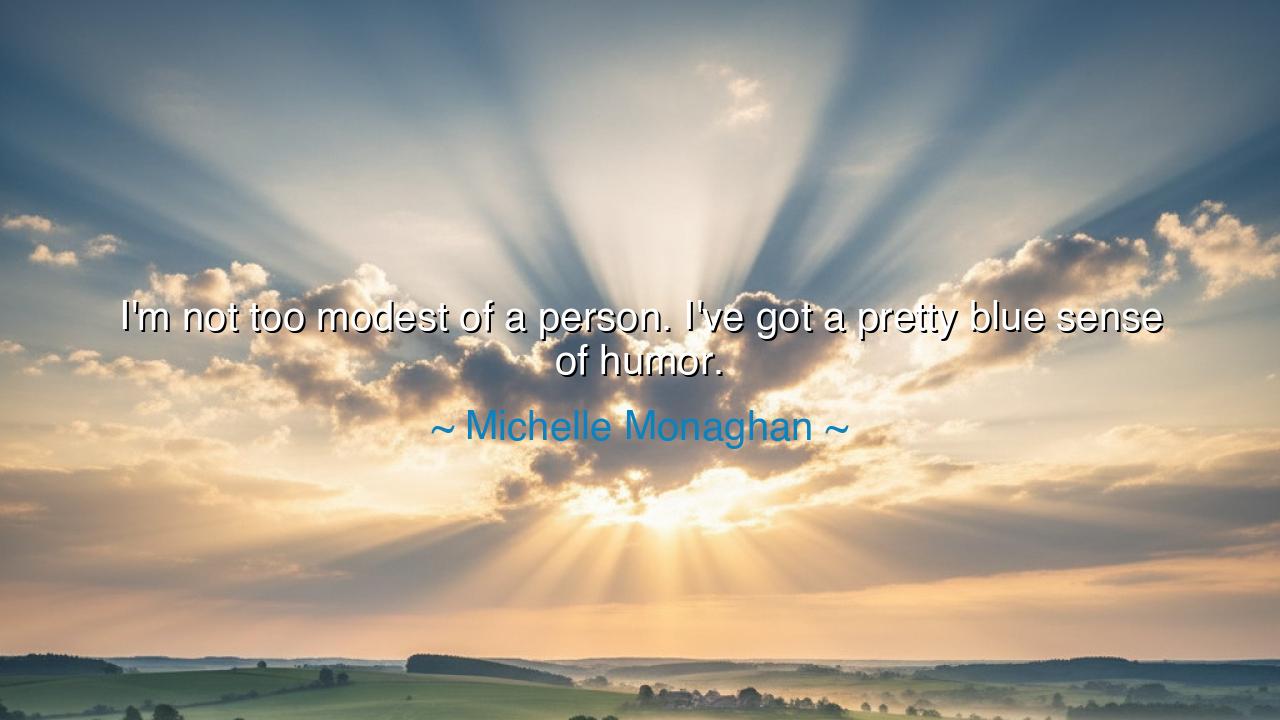
I'm not too modest of a person. I've got a pretty blue sense of






"I'm not too modest of a person. I've got a pretty blue sense of humor." These words, spoken by the Michelle Monaghan, carry with them a certain liberation—a recognition that humor is not just an art of wit and cleverness, but a reflection of one's true self, unfiltered and unabashed. In the ancient world, to speak openly of one's humor was to reveal something deeply personal—a glimpse into the soul’s complexity. Monaghan’s admission of a "blue sense of humor" speaks to the courage it takes to embrace and express aspects of our character that are often considered unconventional or untamed. It is in this rawness, this willingness to laugh without restraint, that the true power of humor lies.
In the ancient traditions of comedy, figures like Aristophanes of Athens used humor not merely as a source of entertainment but as a vehicle for deeper insight. Aristophanes’ plays were filled with what we might call today a "blue sense of humor"—bold, direct, and often laced with social commentary. In his Lysistrata, for example, he used the power of humor to expose the absurdity of war, weaving satire and sexual humor into a powerful message about the folly of human pride. His characters were unashamed to confront the uncomfortable truths of their time, using humor to cut through the social and political fabric. Monaghan, like the ancient playwrights, acknowledges that humor, when used without modesty, becomes a tool of both empowerment and connection.
Similarly, the Stoics like Seneca and Epictetus understood that humor was not to be used only for jest, but also as a means of revealing one’s deeper wisdom. Seneca, though often serious in his writings about virtue and life, also recognized the importance of laughter. He knew that to embrace humor, even in the face of life’s challenges, was a way of demonstrating one's strength. Humor becomes a form of resilience, an expression of the soul’s ability to confront hardship and vulnerability with grace. Monaghan's embrace of her blue sense of humor is a declaration that she, too, understands this deeper truth: humor can be both playful and powerful, a way to reveal the truth of one’s character while breaking down the walls of convention.
Throughout history, we have seen many great leaders and thinkers who wielded humor as a tool for both self-expression and social critique. Mark Twain, for example, often used humor to confront the social injustices of his time, making biting yet insightful remarks about the inequities of slavery and the corruption of government. His humor was blue in its directness, unapologetically poking fun at the absurdities of human behavior. But like Monaghan, Twain’s humor was not merely for amusement—it was a reflection of his deep understanding of human nature, a way of communicating truths that were otherwise too uncomfortable to face head-on. Monaghan's acknowledgment of her own blue humor speaks to the same courage—to reveal one’s true self and invite others into a more honest, vulnerable space.
In more modern times, the use of blue humor has often sparked controversy, as it pushes boundaries and confronts the status quo. But it is precisely because of its boldness that it holds such power. Richard Pryor, for instance, a comedian of the highest order, used humor to address race, identity, and the struggles of marginalized communities. His humor was raw, often unsettling, but always rooted in truth. His unfiltered approach to life’s darkest moments allowed his audience not only to laugh but to reflect on the deeper truths he was exposing. Monaghan’s statement that she has a "blue sense of humor" aligns with this spirit—understanding that humor, at its best, is a force that challenges, connects, and liberates.
The wisdom in Monaghan’s words is a reminder that true humor comes from embracing all aspects of who we are—the light and the dark, the playful and the serious. It is not confined to polite social norms or limited to what is considered acceptable. Instead, humor becomes a reflection of one’s authenticity, a way to navigate the complexities of life with grace and courage. To possess a "blue sense of humor" is not to be vulgar or crude for the sake of it, but to express, openly and freely, the rawness of life’s absurdities. It is a tool of empowerment that invites others to see the world not as it should be, but as it is—and to laugh in the face of that reality.
So, dear listener, let Monaghan's words guide you in your own life. Embrace the full range of your humanity, even the parts that are considered imperfect or unconventional. Do not shy away from humor that is bold, unashamed, and authentic. Use humor not just as a means to entertain, but as a way to express your truest self, to connect with others, and to expose the truths that lie beneath the surface. Like the ancient philosophers, comedians, and thinkers who understood the power of humor to challenge and transform, let your humor be a tool of freedom and honesty. In doing so, you will find a deeper sense of connection, not just with others, but with yourself.






AAdministratorAdministrator
Welcome, honored guests. Please leave a comment, we will respond soon